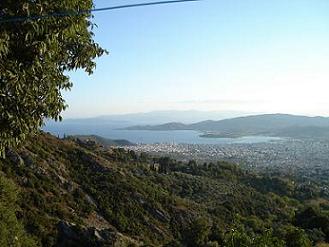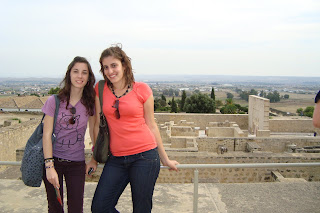

Σάββατο 1 Νοεμβρίου 2008
Πέμπτη 30 Οκτωβρίου 2008
Τετάρτη 29 Οκτωβρίου 2008
[Our week in Spain]

Hello!
Our trip in Spain was an incredible experience for all of us. It’s not only that it was a perfect chance to get to know new lifestyles, traditions and exchange ideas and different viewpoints, but it was also the perfect chance to make friends from 4 other countries. Spending one week together we realized that this experience was unique!!! So we would like to thank you for giving us the opportunity to spend an unforgettable week in Spain!!! WE REALLY MISS YOU!!!
Natasa.
Hi,everybody!
I'm very excited about the trip to Spain!It was a wonderful experience and a good opportunity to learn the spanish culture and history,meet people and make friends from different countries-Spain,Norway,Italy,Germany.I'll never forget the conducted tours in Montoro and Cordoba,the presantation of the spanish program at the theatre,the amusing nights at Amaduz,the last day's party in Carmen's house,the walk in the Mountain...But,mostly,I'll never forget the people who were very friendly with us and made our trip unique!!!
Finally,I would like to thank Magdalena and her family for their hospitality,the spanish teachers and the students for preparing a fantastic week for us!
Thank you for everything...
You are all perfect!
With love,
Athina
MEMORIES...






Τρίτη 27 Μαΐου 2008
[A wonderful week in Germany]

I really want to thank all teachers, students and their families for the warm welcome and the lovely stay in Germany. I was quite nervous in the beginning because I knew only 4 German guys from the Comenius Week in Volos and no one else. But I soon discovered that each person in Germany was really kind and easy to get to know. All the fascinating activities helped us get closer and talk about our countries, interests and much more. During this exciting-and unfortunately fast- week I had the chance to experience a different way of living, local traditions, songs and dances and moreover marvelous landscapes.
But the most important experience was meeting new people from Norway, Italy, Spain and of course the hospitable Germans.
A really big thank you then, for this wonderful week!
Hope to see you all soon!
Much Love,
Rachel

This week was one of the best in my life! It was a great experience! I met new people, Italians, Spanish, Norwegian and of course the guys from Germany!! The first day was a little strange because we have to meet so many new people and to live to a house that u didn’t know anyone!
And we were all the time with the Greek guys . . . but the next day everything was better! We met all the students, because we knew the teachers already! We learned the topical food and beer!!! We made knew friends and probably will meet them again in Greece!
This week turned so fast! I wish we had more time together! the truth is that I miss all the guys so much and sometimes I feel so Sad and I hope someday to meet them again. . . but these good memories don t let me cry because I know that someone, somewhere in Europe feels the same as me! I will never forget this week . . . guys thanks so much, I will never, ever forget u!!!
Love and Kisses
Mary












We want to thank all teachers, students and their families for this amazing week. We'll never forget it.
Τρίτη 29 Απριλίου 2008
Arni sti Souvla: Spit-Roasted Lamb

At Easter in Greece, the air is filled with the smell of lamb or kid roasting on spits. Some are modern motorized rotisseries, requiring little supervision, and others are turned by hand for hours, with family and friends taking turns, all the while enjoying the camaraderie of the day. This recipe is for lamb on a spit, cooked over wood or hardwood charcoal.
INGREDIENTS:
1 whole lamb
aromatic wood (olive, oak, apple, cherry), or hardwood charcoal
olive oil
lemon juice
sea salt
pepper
crushed Greek oregano (rigani)
crushed garlic (optional)
PREPARATION:
Tip: According to local experts, the best size lamb for spit roasting is generally around 22-25 pounds (10-11 kilos). Cooking time is 3-4 hours.)
Start the fire about 2 hours before cooking.
The spit should be at least 20 inches longer than the lamb (10 inches or more to extend out each side).
Sprinkle the inside of the lamb liberally with salt and pepper and rub in.
Lay the lamb on a flat surface and pass the spit between the hind legs, through the stomach cavity and out through the mouth. The lamb's spine should be straight along the line of the spit. Tie the front and hind legs to the spit. Tie the middle of the lamb to the spit or clamp along the spine. (For a larger lamb, tie in two places: behind the front legs and at the top of the hind leg. Sew the stomach cavity closed with butcher's twine or aluminium wire (use a pliers). The lamb should be tied securely and not slip when turned.
With hands rub the entire lamb with lemon juice and oregano.
Place the spit over the fire and spread the coals so they are under the shoulder and thigh (thickest parts). A drip pan can be set under the middle of the animal to catch the juices.
Keep olive oil at hand with a paint brush.

At the beginning, the lamb needs to be turned quickly in order not to burn. Once the fire settles and the lamb is golden all around and starting to crisp, turning can slow, to approximately 1/4 turn every 15 minutes. Replenish wood or charcoal as needed. Brush occasionally with the oil.
Cooking time will depend on the size of the lamb. The skin on the legs and chest of the lamb will crisp and crack open. The colour should be a deep brown.
Testing for doneness: With a meat thermometer, internal temperature at the thickest part should be 155F for medium. If you don’t have a meat thermometer, stick a knife or skewer into the thigh (thickest part). The juice should run clear.
Lift the spit with the lamb and place on carving surface. Remove wire, ties, clamps, or straps, and carve.
Traditional Easter Soup / Mageiritsa

This soup is only made once a year and is traditionally eaten after the Midnight
Mass of the Greek Orthodox Easter.
Ingredients
- liver, lungs, heart & intestines of a young lamb
(intestines optional)
- 10 spring onions, finely chopped
- 1 cup chopped dill
- 1 cup extra virgin olive oil
- 2 eggs & juice of 1-2 fresh lemons
- 1 teaspoon oregano & ½ teaspoon fresh thyme (optional)
The Making
Prepare the organs:
- blanch in boiling water for about 3 minutes
- remove from boiling water, let the meat cool & cut
into small pieces
- in a large pot, add the extra virgin olive oil
- add the small organ pieces & continue to sauté for
another 3 to 4 minutes
- add 7 cups of water, cover pot & cook at low
temperature for 1 hour
- add the onions & dill to the pot
- cover & simmer for another 30 minutes until the liquid
is reduced
- turn off the heat &rest for 15 minutes
Prepare the Avgolemoni sauce:
- beat the eggs lightly in a bowl
- add the lemon juice a little at a time, beating continuously
- while beating, pour in some of the warm broth from the
pot, blend the soup
- add slowly the egg-lemon mixture into the soup & stir
lightly
- adjust to medium-heat & bring soup to a simmer without
letting it boil
- add salt & pepper to taste
- remove from heat & serve
Πέμπτη 24 Απριλίου 2008
[Good Friday]
On Good Friday (Μεγάλη Παρασκευή) everybody has to fast and go to church to see the epitaph, which has been decorated by young girls and women of the local community. They use fresh spring flowers like roses and violets and this habit comes from the ancient times, when girls and women used to decorate dead Adonis’ corpse with flowers and mourn for three days.

In our town about ten epitaphs from the most important churches (St. Nicholas, St. Constantine, Metamorphosis, etc.) meet in the centre of the promenade, by the sea, and it’s very impressive to watch the ceremony with all these priests and bands playing sad marshes and thousands of people following with their lit candles in their hands.



In our town about ten epitaphs from the most important churches (St. Nicholas, St. Constantine, Metamorphosis, etc.) meet in the centre of the promenade, by the sea, and it’s very impressive to watch the ceremony with all these priests and bands playing sad marshes and thousands of people following with their lit candles in their hands.

Εγγραφή σε:
Αναρτήσεις (Atom)





